Computer RPGS: The Wallflowers of the Steam Age? Part 2
Posted by Rampant Coyote on June 11, 2014
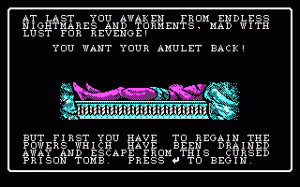 In light of Computer RPGS: The Wallflowers of the Steam Age Part 1, are computer role-playing games worse off in the age of cheap, plentiful games than other genres, and if so, why? What inhibits people from starting them, and once they start, what makes them give up long before the game is complete?
In light of Computer RPGS: The Wallflowers of the Steam Age Part 1, are computer role-playing games worse off in the age of cheap, plentiful games than other genres, and if so, why? What inhibits people from starting them, and once they start, what makes them give up long before the game is complete?
From the responses I’ve seen, the seriousness of the problems with RPGs is more acute than other genres for some gamers, but not others. While the responses were largely from RPG fans, and not from the gaming audience in general (many of whom may very well hate the very notion of the role-playing game), my feeling is that there’s nothing truly unique / specific to RPGs that might make players reluctant to start or complete the games.
That means, for my purposes, I can probably ignore anything that suggests that RPGs should be less RPG-like.
But there are a lot of things that do leave players feeling cold. Trying to combine lots of specific issues into some general problems, here are the top ten reasons, in no particular order:
1. RPGs take too long to complete
For many players, the ability to enjoy the same game for dozens of hours is a virtue, but it is daunting to some. If I only have time for maybe 5 hours of game-playing a week, and a game will require about 70 hours of gameplay to complete, that means I’m going to be “stuck” with that game for several months. While that can be wonderful and exciting, it can also be a bit daunting from the get-go. As plentiful as games are now, a lot of people really want experiences that are between 8-20 hours, rather than the dozens and dozens of hours demanded of RPGs in the “good old days” (which, in retrospect, weren’t always so good). In a lot of ways, the long playing time of the old games gave rise to some of the most time-wasting mechanics still present today.
2. RPGs take too long to get into
This is a bigger issue, and I don’t know anybody who would strongly disagree. While the style and mechanics of RPGs make it difficult for the player to really “get” the story and and mechanics in the first five or ten minutes, many games can do a lot better. The culprits are too numerous to name, but I’d say some of the bigger, mainstream titles are worse culprits. It’s like they are so afraid of exposing players to the complexity of the game that they never turn control over to the player. Likewise, the stories may be deep and interesting, but it takes forever to really offer the player a “hook.”
3. RPGs demand long gameplay sessions
Some players complain that – either because of save point limitations or simply the dearth of natural breaking points, RPGs often feel like they need long, solid stretches of gameplay. This limits the appeal, because adult players often find their time to game in much smaller segments – ten minutes here, a half-hour there. We may have twelve hours a week we can devote to gaming, but never in any block of time larger than an hour. If we feel we can’t enjoy and make progress in an RPG in that time, we’re not going to play it during our twenty-minute “breaks.”
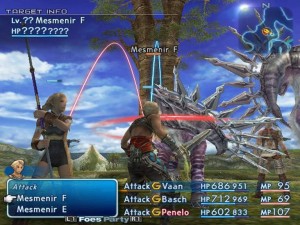 4. Mechanics grow stale after several hours
4. Mechanics grow stale after several hours
If the players feel like they are just grinding – not gaining any truly new toys or powers to play with – and facing very similar challenges hour after hour, they are going to get bored and quit. There’s nothing exciting about gaining five levels only to learn you are fighting a level 28 orc instead of a level 23 orc, using exactly the same strategies.
Worse – and I have heard this from a lot of people – is when the game mechanics really require very little strategy, and are really dependent on character attributes / levels more than anything else. This leads to grinding, as the only way to get past parts of the game is to make your character stronger, rather than trying to be more clever about it.
5. Storyline grows stale after several hours (or never gets going in the first place!)
I personally feel that a good story can make up for (or at least temporarily fill in for) mediocre mechanics in an RPG. I’m also of the opinion that you can have a great game with little or no story (see most roguelikes…). But in a story-heavy RPG, if players are still having a tough time wondering why they should care what’s going on, it’s going to be hard for them to care about double-clicking the game icon when there are promises of more entertaining games out there.
6. Generic Settings and Storylines
I only remember seeing a couple of comments about this, but I immediately agreed. I can’t remember how many times I’ve been turned off by a game by the introduction, because it sounds like the same kind of crap I’ve already played a dozen times before.
The thing is – not only does this not necessarily require a major effort in world-building, but that’s actually probably counter-productive. People are comfortable with popular fantasy tropes in a way that they wouldn’t be if everything is bizarre, weird, and new. What’s often needed is attention and detail paid at the micro scale, not at the macro scale. Even if the world as a whole is a Tolkien-inspired D&D-style FauxEuropeanMedievalWorld, if there are some unique ideas and strange occurrences a-brewing in my character’s alchemist’s guild when the game opens, I can be intrigued. Just as I can be intrigued by a million stories taking place somewhere in “the modern world.” There’s no excuse for not having something to make the setting and story “fresh.”
7. Hard to continue after an absence
This includes both forgetting how to play, and simply being unable to remember where you were and what you were doing after an extended time away from the game. It happens – especially when games are pretty long. Maybe a new, shiny game “interrupted” our RPG, but we fully intended to come back to it. But when we try, we are immediately lost. So we don’t have much fun, and by the time we quit we’ve only barely gotten back on track, but we’re no longer motivated to play again.
This is possibly the number one complaint I heard from people. Some of the problem may stem from most RPGs not being easily playable in bite-sized sessions. But the key point is the assumption that a player will play the RPG from start to finish without major interruption, so they should have kept everything in their head. Not so, especially not in the modern gaming era. “Binge-playing” is now the exception, not the rule.
This is one area where the virtue of a genre (for example, non-linear gameplay) can become a liability if designers aren’t careful.
8. Lost in Creation
Some players get confused / lost during character creation. Too much to control, and even with instructions its hard to know how the abilities will play out in the game itself.
9. Random, “Filler” Combat
Yeah, some people don’t like surprises, and always want to be the ones to initiate combat. But the problem is made so much worse when the combat doesn’t really have a point, have any real challenge, and serves no purpose other than to slow down progress in the game. People who prefer the exploration aspect (like me) may be willing to accept risk that comes with it, but don’t want to feel penalized for doing so with tedious fights.
10. Frustration Tolerance Exceeded
I didn’t see this one too often, but combined with point 7, this is an issue. After being stymied by a tough boss (especially when it’s clear that going back and grinding more levels is all but required), or a tough puzzle, or simply getting lost in a “what do I do now?” situation, it’s easy to drop the game for a few days. If the game is no less frustrating the next session – or worse, it is more frustrating due to difficulties getting “back into” the game, then it may become indefinitely / permanently shelved.
So there are ten of the reasons players may shy away from or discontinue an RPG. Are there others? Certainly. But it sounds like those are some of the more common reasons cited.
I’d like to work on a part 3 of this series, but it may not be tomorrow. I’d like to talk about some of the solutions to these perceived problems. These can range from well-established practices by modern developers, to wild and experimental concepts that might not work at all, but await some brave indie to give it a try.
Please add your own ideas here. What are some problems I missed, and what are some ways to fix any of these that you’d like to see become common?
Filed Under: Biz, Design, Indie Evangelism - Comments: 8 Comments to Read
Computer RPGS: The Wallflowers of the Steam Age? Part 1
Posted by Rampant Coyote on June 10, 2014
 I’ve been a fan of computer role-playing games since the days when they were not known by that name, and weren’t much more than a mid-week substitute for a weekend Dungeons & Dragons game with friends. Some of my fondest gaming memories involve me sinking my teeth into a massive, meaty RPG, getting lost for hours at a time in a world of massive underworld complexes, fearsome monsters, dastardly puzzles, twisted plots (sometimes), and lots of loot.
I’ve been a fan of computer role-playing games since the days when they were not known by that name, and weren’t much more than a mid-week substitute for a weekend Dungeons & Dragons game with friends. Some of my fondest gaming memories involve me sinking my teeth into a massive, meaty RPG, getting lost for hours at a time in a world of massive underworld complexes, fearsome monsters, dastardly puzzles, twisted plots (sometimes), and lots of loot.
Yeah, not every moment was great. Some of the fights in Pool of Radiance were tedious beyond belief, especially when you didn’t have a large area effect spell like Stinking Cloud or Fireball handy. But I was young and had time on my hands – more time than money, at least. I could only afford a new game every month or two, so patience came easy. As a student, games were expensive, but time was plentiful.
Flash forward to today. Between Steam, Desura, GOG, direct-purchases, and a handful from Gamer’s Gate and Gamestop, I don’t want to think about how many games I have in my “backlog.” That’s becoming true for a lot of PC gamers – we’re deluged with cheap less-recent and indie titles, constant sales and bundle deals. It’s even worse (in some ways) for the less mature but even more saturated mobile market.
This is changing how we purchase and play games, including role-playing games. (RPGFan)
Although perhaps things haven’t changed that much. When I was a kid, I’d go to the arcade and rarely put more than two or three quarters into the same machine at a visit. There were too many games, and too little time (or quarters)! I was something of a game browser, rather than specializing in one or two favorites and mastering them. I find myself falling into the same patterns today. It takes discipline and a good game for me to stick with it for more than an hour or two. There are too many games for me to try!
If I do stick with it, and it’s quick and replayable, it may become a “go-to” game for those moments I’m seeking a short distraction.
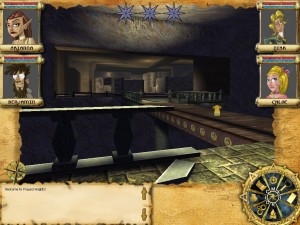 The thing is – RPGs, by and large, require a commitment. They are a favorite genre and I love it when I am fully immersed in these worlds and can play for hours without realizing how much time has passed. But getting to that point can take some effort, and when I’m tired and cranky and seeking a quick distraction, it can be daunting. It’s hard to see how much fun you will be having seven or eight hours down the road.
The thing is – RPGs, by and large, require a commitment. They are a favorite genre and I love it when I am fully immersed in these worlds and can play for hours without realizing how much time has passed. But getting to that point can take some effort, and when I’m tired and cranky and seeking a quick distraction, it can be daunting. It’s hard to see how much fun you will be having seven or eight hours down the road.
RPGs should not be the wallflower genre of the PC in this day and age. In theory, it should be a wonderful, golden age of awesomeness for RPG fans. After being declared dead at least twice, the genre is back with a vengeance, from high-budget AAA spectacles to spartan indie experiments. We’ve got Bioware and Bethesda blockbusters, middle-tier love-letters to genre fans like Wasteland 2, Pillars of Eternity, and Legend of Grimrock, so many games in the style of 16-bit console JRPGs that people complain about it, experiments in the genre like Defender’s Quest and Heroes of a Broken Land, and an incredible variety of new, indie takes on classic RPG styles. Seriously, it’s better than I could have dreamed of ten years ago.
But a lot of these games are languishing undiscovered – or, shockingly, purchased unplayed (or even uninstalled). I have a few of ’em myself. Genre fans are becoming collectors – hoarders. This is true of all game types to a degree, but RPGs seem to suffer more than most. (As an aside… I think I have more untried strategy games in my backlog than RPGs. They have some of the same problems, including a perceived large up-front learning curve).
 I did some informal polling of friends, twitter folks, forums, and a little bit of a self-assessment. While there are definitely some things that game developers can do in general, my question was more of why computer role-playing games, in this era of plenty (or “glut” if we’re feeling less charitable) end up unfinished… or even untried. The results were unsurprising, but worth discussion. That will be tomorrow’s post.
I did some informal polling of friends, twitter folks, forums, and a little bit of a self-assessment. While there are definitely some things that game developers can do in general, my question was more of why computer role-playing games, in this era of plenty (or “glut” if we’re feeling less charitable) end up unfinished… or even untried. The results were unsurprising, but worth discussion. That will be tomorrow’s post.
One of the problems for me is that I wouldn’t want to mess up the core nature of the role-playing game to make it easier-to-consume. There’s a reason, when I finally allow myself to get drawn into a good RPG, that the hours fly. I am vehemently against the AAA trend to make RPGs more like action games because action games are more accessible (not to mention a lot easier to make). But I do think there are some modifications to the core structure that can make RPGs more inviting, easier to get into, and easier to stick with to the end.
More next time. But in the meantime, I’ll keep asking the same questions. CRPG fans: Do you have a glut of unfinished (or unplayed / uninstalled) role-playing games? Is it any better / worse than other game genres? What held you back from trying / completing the game? Have your gaming habits changed, and have RPGs failed to keep up?
Thanks!
Filed Under: Biz, Indie Evangelism - Comments: 12 Comments to Read
“Go-To” Games
Posted by Rampant Coyote on June 9, 2014
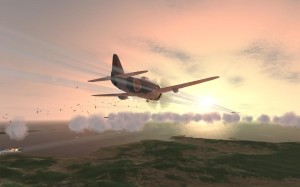 Yes, I use games to waste time. I use games to procrastinate stuff I’m supposed to be doing. I admit it.
Yes, I use games to waste time. I use games to procrastinate stuff I’m supposed to be doing. I admit it.
In particular, I tend to have one game – sometimes two – that becomes my brain’s release valve. I gravitate to it when I don’t have anything in particular in mind other than just going into idle mode for a little while. These games will serve as my “go-to” games for months at a time. When I’m feeling the need for a distraction (sadly, something that happens way too often), they’ll be the games of habit that I’ll naturally crave.
In order for a game to become my “go-to” time-waster of choice, I have to be fairly familiar with it. It’s not something where I’m actively learning how to play – though I’ll of course be improving my skills as I play. It should be repetitive and a self-contained experience so I don’t have to worry about making long-term decisions while I’m in semi-autopilot. It should be something with plenty of variation, either provided automatically, or giving plenty of options to toggle to vary the set-up a bit to keep things from getting boring when I will play it almost every day. It must be a game that is not too challenging – I want to play it to escape frustration, not to cause it. It’s usually a PC game, because it’s something that I can take a break on without leaving the room and starting up a console.
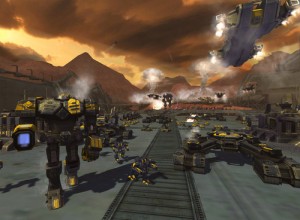 In the past, these “go to games” have included Supreme Commander I and II and Rise of Nations. Lately, Catan on my tablet has been a good one. Tower defense games have fulfilled that role. The problem with those kinds of games is that they can get pretty time consuming. I’m not a “rush” style player, so a single game can often go 30, 45, or even more than 60 minutes. While I’m playing these games to waste time, I’d rather not waste that much time all at once…
In the past, these “go to games” have included Supreme Commander I and II and Rise of Nations. Lately, Catan on my tablet has been a good one. Tower defense games have fulfilled that role. The problem with those kinds of games is that they can get pretty time consuming. I’m not a “rush” style player, so a single game can often go 30, 45, or even more than 60 minutes. While I’m playing these games to waste time, I’d rather not waste that much time all at once…
Combat flight sims have served, too, where I can whip together an “instant” mission. The IL-2 Sturmovik series (especially IL-2 Sturmovik: 1946) was especially handy in this respect. The World War II era warplanes are a bit easier to handle than a fully-featured modern jet, but all that really matters is how comfortable and familiar I am with the simulator. Left 4 Dead 1 and 2 were also great “go-to” games, as they were straightforward and always a little different. And hey, shooting up zombies is always fun.
There were some dark days a few years ago when some casual games served in that role. Like Bejeweled Blitz on Facebook. I’m not proud of that era…
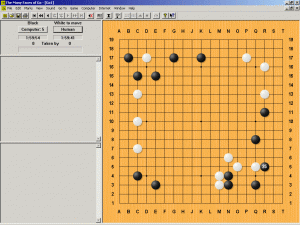 (Actually, that’s not at all true. It was a good game, and I enjoyed it a great deal. But for a quick game – it was what, two minutes long? – I kept playing way too many times in a row in a single sitting…)
(Actually, that’s not at all true. It was a good game, and I enjoyed it a great deal. But for a quick game – it was what, two minutes long? – I kept playing way too many times in a row in a single sitting…)
About three years ago, I shelled out the cash for Many Faces of Go. That still occasionally serves. I felt good about this one, because my Go game has improved as a result, which can be played outside the confines of the computer program. Unfortunately, I haven’t played a lot of human partners in that time, and I fear a lot of my improvements may be based on weaknesses in the computer’s game. Still, the computer plays much, much better than me (I’m playing pretty close to the lowest difficulty setting), so hopefully I can play another human without embarrassing myself too badly.
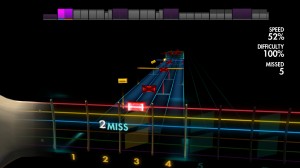 Lately, I’ve sought to take advantage of my laziness, and made a habit out of Rocksmith 2014. I keep my guitar next to my desk, so that it takes almost no effort to plug in and play the game (an important trick, I suspect). I had to force myself for a few weeks, but now it’s a habit. Sometimes I’ll even just fiddle with the guitar for ten minutes or so without even running the game, which is good, too. I’ve managed to deliberately turn my inherent lazy tendencies to something productive, which is nice. It’s worked well.
Lately, I’ve sought to take advantage of my laziness, and made a habit out of Rocksmith 2014. I keep my guitar next to my desk, so that it takes almost no effort to plug in and play the game (an important trick, I suspect). I had to force myself for a few weeks, but now it’s a habit. Sometimes I’ll even just fiddle with the guitar for ten minutes or so without even running the game, which is good, too. I’ve managed to deliberately turn my inherent lazy tendencies to something productive, which is nice. It’s worked well.
It’s also one of the few games in my Steam list where I’m proud to have the “hours played” field in the triple digits. If skill in playing the guitar is heavily dependent on the time invested in practice, I consider that value to be almost as useful as a measure of skill as my scores in the game.
There have been a couple of times that I put dumbbells next to my desk in a belief that I could do some quick curls or something during my time-wasting sessions. That has never panned out. Maybe I need to turn that into a game, too…
Anyway – that’s how I roll. It’s also how some games on my Steam list have embarrassingly high numbers of hours played, while the bulk of the games in my account have less than an hour played (often never even installed).
So how about you? Do you have favorite games that you go back to on a regular basis, even daily, for a “quick fix”?
Filed Under: Geek Life - Comments: 8 Comments to Read
GOG Galaxy?
Posted by Rampant Coyote on June 6, 2014
I know, all we need is another game client, right?
GOG.COM seems to be going a different direction with their upcoming GOG Galaxy client, though. It’s billing itself as an “optional client” with no DRM and no online activation required. Which is pretty how the Desura client works, so that’s not completely unprecedented. It sounds like it will allow (optional) online profiles, which enable achievement unlocking and the ability to communicate with friends online – whichever features you wish to enable. The client will – if you choose – allow automatic updating of games.
So far, so standard, other than the piecemeal enabling of features with an emphasis on no online requirements. There’s an interesting feature they are calling “cross-play” which will be interesting to see how it pans out. The idea is that they want compatibility in multiplayer games so that all players can play together regardless of which client or service they are using. Honestly, I don’t play that many multiplayer games anymore, so I really don’t know how much of a problem that is.
I was very much against having yet another game client a couple of years ago. But now I have a crapload of games from GOG.COM (more than I have in Steam, actually…),and having automatic updates might be kinda handy. Depending on how they pull it off, I’ve warmed up to the idea.
For indie games, I still like to buy direct, but that sometimes requires me to have enough familiarity with the developer that I feel I can email them if there’s a problem. Really, there are so many indies out there that nowadays that are unknowns, don’t have much of a web-presence, or don’t even want people to buy direct, so that’s happening for me a lot less.
Beyond that, nowadays, GOG.COM tends to be my “preferred provider” – mainly for the DRM-free aspect, and the fun bonus items that come with many games (mainly wallpaper and soundtracks, or the rare but awesome design documents). Desura is where I go to get the weird, unusual, niche stuff that can’t win the massive popularity / marketing contests required to get on Steam. Or through some bundles (like Indie Royale). I “only” go to Steam for the rare new AAA releases that I indulge in, or for the steeply discounted sales. Or through a bundle that provides Steam keys. Which has been enough to make my Steam library swell up by over a hundred games this last year, so those aren’t exactly tough restrictions…
Origin is only there because it was forced on me, and I turn the client off if I’m not playing the game in question. UPlay is kinda the same way… it’s there for Might & Magic X and Rocksmith 2014, and that’s it. I can’t remember the last time I ran the Gamestop client.
I still don’t feel great about having a bunch of clients on all the time. But at least this new one sounds unobtrusive… Now, if they REALLY wanted to impress me, they could start emulating the multiplayer servers for the old games they sell (which no longer work in multiplayer because the servers have been shut down). THAT would be cool… although a probably a crapload of work for a pretty small audience.
Filed Under: Biz - Comments: 3 Comments to Read
Steam Warns Customers About Early Access
Posted by Rampant Coyote on June 5, 2014
So it looks like Valve has taken the rash of abandoned “early access” games to heart (and has started worrying about its own exposure to lawsuits).
Valve warning: Steam “Early Access” games may never be finished
Honestly, I’m kinda surprised Valve didn’t do that in the first place. Were they so far out-of-touch with indie game development that they really thought that in-development games couldn’t get greenlit if they all hype and tech demo? That they’d be surprised that developers might be really good at generating enthusiasm but have no clue how to “finish” a game? That game development teams would never “take the money and run” after the revenue dropped down to a trickle? That developers would never stamp “1.0” on a game that still doesn’t meet (reasonable) customer satisfaction?
Now, again, I’m not really slamming early access, although I admit it’s hard not to feel some level of sour grapes when I spend months and months “finishing” and polishing a game, and can’t shake the belief that people are willing to spend much more on the promise of a game than an actual released, final game. If I didn’t care about ethics or trashing my reputation (‘cuz it would eventually get back to me, no matter how careful I’d be with pseudonyms), I could just crank out tech demo after tech demo with wild ideas and promises and cash in! While it’s possible some scam artists are doing just that, I really don’t believe that’s the case the vast majority of early access games.
I think most “indie gamers” (gamers familiar with the indie scene) have at least a basic understanding that you can’t trust wild promises and cool-looking promo videos or tech demos. But even I have been burned on this before, and I should know better than most. So I’m sure it’s the right thing for Valve to do, and maybe it’ll help some people get more realistic expectations. And maybe not pay so much more for the promise of a dream game than the inevitably less ideal implementation.
And it once again points to the inevitable question: What is a “finished” game anyway? I’ve released several updates to Frayed Knights: The Skull of S’makh-Daon since it’s “release,” so maybe it is still unfinished. I’m not actively working on it at the moment, but that could change at any time.
Be wise, I guess. Promises are great things, but know who’s giving the promise.
Filed Under: Biz - Comments: Comments are off for this article
How Long Until a Clone Becomes a “Spiritual Descendant?”
Posted by Rampant Coyote on June 4, 2014
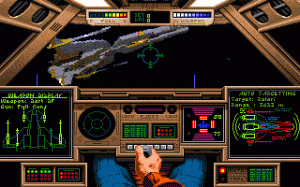 Long-time readers will know I’ve got a soft spot for space-combat games. I was kind of a Wing Commander junkie in my much younger years. But hey, I was working for the summer in a strange town, no friends around, my fiance was back at school for the summer, and I had very little entertainment budget. I had to “make do” with Wing Commander 1. Not that I minded this at all.
Long-time readers will know I’ve got a soft spot for space-combat games. I was kind of a Wing Commander junkie in my much younger years. But hey, I was working for the summer in a strange town, no friends around, my fiance was back at school for the summer, and I had very little entertainment budget. I had to “make do” with Wing Commander 1. Not that I minded this at all.
I lived and breathed the game. It felt like it had been custom-made for me. I was fully immersed. I was 2nd Lieutenant “Blue Hair.” At one point, I could tell you the armor level on the front of a Drayman class transport, or the number of guns on the Venture Corvette… a ship which made one brief appearance in the original WC1 campaign, if I recall correctly. Anyway – yeah. I loved the game. I was a big Origin fanboy back then…
Unfortunately, that style of space combat simulator went the way of the dodo in the late 90s, after a really good run with games like X-Wing, TIE Fighter, and the Freespace series. And some less-great games (I did play Star Crusader and XF5700 Mantis: Experimental Fighter to completion, I’ll have you know…) I guess the genre really had run its course when I found myself unimpressed with Wing Commander: Prophecy, and I could never manage to get more than a few missions into Chris Roberts’ post-Origin effort Starlancer.
It’s been a long time, though. Sure, there have been a few small entries into the genre since then, especially among the indies. My first commercial indie game, Void War, was inspired by these old games as well, and was an attempt to take space combat in a new, interesting direction. I’ve played a few of these recent space combat games, but I don’t know if it’s possible for anything to grab me the way Wing Commander or X-Wing did. Wing Commander in particular (especially the earlier two games) really straddled that combination of simulation and storytelling, and it was that combo that really sucked me in.
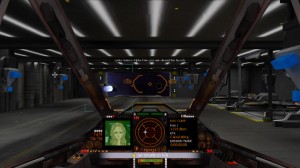 Now that the insanity of the previous three weeks has died down a little bit, I’ve actually found time to play games again. One of these games has been Eterium, a recently-released space combat game from Rogue Earth LLC. I’m not too far into it yet, but it’s got a very, very strong Wing Commander vibe. In fact, swap out just a few details, and the first couple of missions could have been taken right out of Wing Commander 1′s design document (and a few details from Wing Commander 2‘s storyline). In fact, I’d say that Eterium is about as close to a modern remake of Wing Commander 1 & 2 as one can be legally safe without the license. While it certainly pulls in ideas from other games, and uses anime-inspired characters (but then, WC1′s character design was a little anime-inspired, too…), this seems like a very competent fan-made remake.
Now that the insanity of the previous three weeks has died down a little bit, I’ve actually found time to play games again. One of these games has been Eterium, a recently-released space combat game from Rogue Earth LLC. I’m not too far into it yet, but it’s got a very, very strong Wing Commander vibe. In fact, swap out just a few details, and the first couple of missions could have been taken right out of Wing Commander 1′s design document (and a few details from Wing Commander 2‘s storyline). In fact, I’d say that Eterium is about as close to a modern remake of Wing Commander 1 & 2 as one can be legally safe without the license. While it certainly pulls in ideas from other games, and uses anime-inspired characters (but then, WC1′s character design was a little anime-inspired, too…), this seems like a very competent fan-made remake.
If there weren’t 20+ years and light-years of technological differences between the two, you could probably call Eterium a clone. Maybe this impression will fade after I’m a few more missions into the game, but as of right now, I feel like I’m settling down into very familiar territory. The fights are a bit harder, even though the old skills still work against the AI. There’s even a simulator in the rec room with a high score list to compare against the other pilots (a feature I loved in WC1).
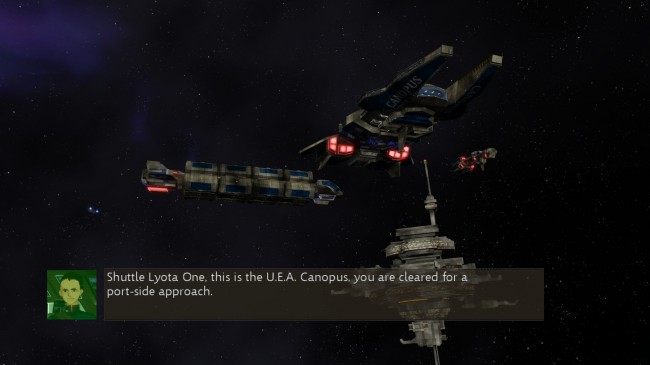 But I feel it’s a disservice to both games to call Eterium a “clone.” I guess after a certain point, it’s really much more of a “spiritual descendant.” But I’m not sure where to draw that line. There are a few things that Eterium adds to the mix – such as a more detailed damage model, and theoretically some dynamic mission creation (which I can’t say if I’ve recognized yet, but I imagine it could make the missions harder to create a walkthrough for). But for the most part, it sticks perhaps too closely to the tried and true.
But I feel it’s a disservice to both games to call Eterium a “clone.” I guess after a certain point, it’s really much more of a “spiritual descendant.” But I’m not sure where to draw that line. There are a few things that Eterium adds to the mix – such as a more detailed damage model, and theoretically some dynamic mission creation (which I can’t say if I’ve recognized yet, but I imagine it could make the missions harder to create a walkthrough for). But for the most part, it sticks perhaps too closely to the tried and true.
But here’s the thing: It’s been so long now that a lot of gamers have no experience with the predecessor. So in that respect, Eterium would be kind of a new experience for them. And honestly – the simplicity can be kind of refreshing. It’s got enough simulator elements to provide something more than a straight-up action game, but not so much that it gets bogged down or becomes hard to play. That’s a good thing.
A lot of its success will probably come down to the story. It was that story and context that made the missions interesting in the old days. Otherwise, it just feels like endless waves of bad guys with slight variations in composition and victory conditions. And while the missions are extremely familiar, it is interesting getting to know the capabilities of all the friendly and enemy ships and weapons, and trying to make sense of the cast of characters and what’s going on.
Maybe the difference between “clone” and “spiritual descendant” comes down more to intent and care put into the derivative product. While Rogue Earth is clearly holding fast to the tried and true, sometimes you have to start at a known location before wandering off in new directions. Again, from what I have played so far, it seems like they have really put a great deal of effort building a new universe and game system together into a straightforward but polished title.
So there’s a part of me that really doesn’t care if it is too similar to its predecessor(s). I’m just having fun.
Filed Under: Flight Sims - Comments: 8 Comments to Read
RPG Maker Bundle Discount – And a Contest!
Posted by Rampant Coyote on June 3, 2014
If you ever thought about making a game with RPG Maker, now would be the time. And there’s only a little over a day left, so do it fast:
Humble Weekly Bundle: RPG Maker Pay What You Want Bundle
Of course, whenever I see something like this, I assume that there’s a brand new version waiting in the wings. But that doesn’t make the deal any worse.
On top of that… there’s a CONTEST! Make a game with RPG Maker this month, and get a chance of winning up to 11 cash prizes, up to $10,000! That’s not too shabby! And… while the contest is being co-sponsored by RPG Maker *and* Humble Bundle, there are no restrictions on genre or engine! I haven’t checked the official rules in detail, but it does have to be something that you worked on only during this month (and May 31). That limits it to small games that can be developed in about a week and change, and then polished like crazy for 2-3 more weeks.
I won’t be participating. Not with the Comic Con deadline looming… 🙂 But what a fantastic opportunity to break the ice, get your “one game a month” goal rocking, or whatever!
Anyway… there are (as of right now) about 150,000 people who have purchased this bundle. If only 5% of the people who grabbed it make a game with it for public release in the next two years, that is a HECK of a lot of new RPG Maker games. I know what you are thinking. I feel the same knee-jerk reaction. But honestly?
1. There’s always room for more great games.
2. As a developer, don’t be average!
3. As a gamer, be willing to take a risk on an unknown game every once in a while, and share your experiences / opinions.
As always, have fun!
Filed Under: Deals, Game Development - Comments: Read the First Comment
Terra Mechanica; Frayed Knights 2 Coming to Salt Lake Comic Con
Posted by Rampant Coyote on June 2, 2014
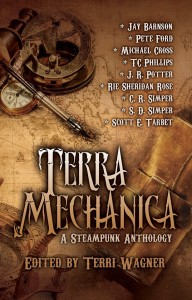 As you’ve no doubt noticed if you check the blog lately, I’ve been doing double-duty as a game developer and a writer. I hope to get some serious cross-training advantages in both categories.
As you’ve no doubt noticed if you check the blog lately, I’ve been doing double-duty as a game developer and a writer. I hope to get some serious cross-training advantages in both categories.
I’ve worked on a few short stories, and now I have had my first one published in Terra Mechanica: A Steampunk Anthology. It was officially launched Saturday, and can be had through Amazon (at the link), but is also available via Barnes & Noble, Smashwords, and I’m sure several other sites… both in print and e-book editions. I haven’t seen the paperback version yet, but I have a small box of them arriving hopefully today… (I think we also are in a program right now on Amazon where if you get the paperback, you can get the kindle version for only $0.99. I’m not positive on that one, or if that is only a temporary deal… but I like it.)
I read the book, and enjoyed the stories by my fellow contributors a great deal. They really ran the gamut of style, theme, and what could be termed “Steampunk.” I liked that a lot. Some are pretty low-key on the speculative fiction end of things, while others are wild rides in alien worlds. Some are pretty light-hearted, some serious, and one is downright dark. It’s a very good mix, and a good introduction to the subgenre, if I do say so myself.
But now that the book is OUT and I breathe a little bit of a sigh of relief, I can continue talking about some Frayed Knights -related stuff, too!
I have signed up to be part of a big combined indie … well, I don’t want to call it a “megabooth,” ‘cuz that name has been taken, but it’s a giant booth for indies at the 2014 Salt Lake Comic Con, September 4-6! Woot! Frayed Knights 2 will not be ready for sale at that point, but it will be playable, and we’ll be selling copies of Frayed Knights: The Skull of S’makh-Daon as well as some books (like Terra Mechanica), and getting as many email addresses as we can to prep for launch for the sequel. We’ve got a long way to go and a short time to get there, as the song says, but we mainly need to get some content up to snuff.
I kinda regret not going the route I did with the first game, with the “Pilot” episode. Maybe things would have happened faster if I did. In the meantime, I am planning on taking advantage of some of Unity’s capabilities. While it will pull dev time away from “real” development, I want to release some snippets of the game as online, web-playable demos for people to test out and provide feedback. In particular, I’ve done some weird stuff with combat that I believe works very well, but I really need to hear what people think. As things are running more bug-free and less white-box-looking, I would like to have some volunteers (like… everybody interested) play these bits and provide feedback.
With luck (and a crapload of work), we can come up with something that random passers-by at a major convention can pick up and play and have fun with within a three-to-five minute window at the convention.
All I can say is that at least I don’t ever have to worry about being bored…
Filed Under: Books, Frayed Knights - Comments: 2 Comments to Read
Utah Indie Night – May 2014
Posted by Rampant Coyote on May 30, 2014
This month’s Utah Indie Night was held in room 404 in the CS building at Utah Valley University. In spite of it’s number, most attendees were able to find the room okay.
Josh Sutphin of Third-Helix gave the formal presentation, and it was awesome. It was all about how to become a full-time indie game developer. In his case, it may not be exactly “full-time,” as he does a good deal of consulting work to pay the bills. His goal is to pay all the bills and meat his monthly costs in 20 hours a week of contract/consulting work (which is cool in and of itself), to subsidize his indie development.
A lot of his talk was devoted to how to freelance and do contract work, which was interesting in its own right. But at the end, he talked about productivity and how to “stay sane” as a self-employed indie game developer. Seriously, that part of the talk was worth the trip to Orem all by itself.
He promises to have his slides up from his presentation (and a video?!?) soon, but some of his bits of practical advice for productivity and sanity included:
* Set boundaries and defend them – some people won’t understand that you are actually running a business and are, if anything, *more* busy than you were working at an office for somebody else.
* Establish a rhythm & routine for daily work. This isn’t a rigid schedule, but more of a pattern that you follow each working day, to get your mind & body into a natural ebb & flow for the day.
* Do the 3 most important things first. Not the most urgent things, the most important things – the things that will provide the most value to you or your customer.
* Track your time. This helped him discover how much time he was putting into “unimportant”, useless tasks (which weren’t even worth tracking). Toggl.com is a good site to help do this.
* Don’t forget to play! Rest, and relax. Part of the reason you do the 3 most important things first was so that you can fight “freelancer’s guilt” – you *know* you provided value to your customer, got your job done, and put in a good day’s work, and can now afford to unplug and enjoy life.
There are a couple of dangers he alluded to by going full-time indie. The first is that you end up squandering it, wasting time, and burn through your runway capital to the point where you have to get a full-time job again. The other was that you can work yourself crazy, as bad as the crazy crunch-mode-driven psycho work environments of the AAA gaming industry.
After his fantastic presentation, we moved to the informal presentations and the mingling / networking. I tend to mingle more than I play games – I really love hearing other people’s experiences in this field. And I love catching up with old friends.
Steve Taylor did show me a little indie game he’s working on, which was extremely clever and cool. I don’t know if it has a name, but it involved using track switches to direct a train to pick up / transfer / deliver items in a puzzle-game format. This is something I want to play more of when it’s done. It was a pretty original idea, and while the basic rules of the game were very simple, things got complicated very quickly.
Curtis Mirci had his first Unity-based game, a simple match-3 game using Japanese characters as the tiles. They had distinguishing colored backgrounds to help you tell them apart, which I liked (some characters are pretty similar, so it helped). Apparently, if I could hear the sounds, when you connect three you get the sound the character makes. I thought it would be a fantastic little game for an absolute beginner wanting to learn Japanese. In a “Wax On, Wax Off” style, you’ll gain some familiarity in the language without realizing (or caring) that you are learning anything. It’s not like you’d learn the language just from playing the game or anything, but I could see how someone who played it for several hours prior to taking their first language classes could have a leg up in familiarity just due to exposure.
Because I have devoted a fair amount of time recently (especially the last couple of weeks) to writing, I did have some conversations with people about the parallels I’ve discovered between the indie writing / publishing biz and indie games.
It was exactly the kind of evening I needed to have. Thanks to Greg Squire, as always, for organizing and running this event, to Josh for his presentation, and for everybody attending for participating. I always come away feeling energized.
Filed Under: Utah Indie Game Night - Comments: 2 Comments to Read
Terra Mechanica “Virtual” Launch Party – There will be … SWAG!
Posted by Rampant Coyote on May 29, 2014
 So this is something kinda different for me. Something I might take advantage of as an indie game developer in the future…
So this is something kinda different for me. Something I might take advantage of as an indie game developer in the future…
Little indie book publishers deal with the same problems as indie game developers & indie game publishers. Events are important, but they can’t afford big New York City launches where they invite the press. Instead, they do “virtual” launch parties, an online meet-and-greed with a chance to chat with authors, some games, and… prizes. Swag!!!
With a recent virtual launch party, they managed to break Facebook’s online chat functionality, which was pretty awesome (if kind of awkward with 15 minutes of “dead air”).
It’d be cool if we did it for the launch of Terra Mechanica: A Steampunk Anthology
Saturday. You do need a Facebook account to attend, as it’s all takes place inside Facebook’s chat / meeting interface.
For a chance at some of the prizes, it could be helpful to know the stories in the book, but not essential. During my half-hour session of hosting, I will be giving away copies of Frayed Knights: The Skull of S’makh-Daon, and also my wife’s excellent storytelling audio CD, “The Light Princess & Other Tales.” I don’t know yet what everyone else will be giving away, but it sounds like there will be a prize offered about every 7-10 minutes on the average. (I’ve only attended the tail end of one of these events before, so I’m a newb and not 100% sure of what to expect, either…)
My “shift” if you wanna chat (like we don’t chat all the time? 🙂 ) is at 8:00 Mountain Time (9:00 CDT), but I encourage you to pop in anytime. Some of us have a *lot* more experience than others (*cough*me*cough*), but we’re all happy to do the indie thing and have direct contact with our audience. If you do come in during my shift, feel free to work gaming or anything else into the conversation.
Terra Mechanica Online Launch Part – On Facebook – Saturday, May 31, 7:00 PM CDT
Also – as a reminder – the sale on all of Xchyler’s previous anthologies is still going on. $0.99 for the kindle versions. I hadn’t picked up A Dash of Madness yet, and I only had an ARC version of Moments in Millennia
, so I snagged those while I could. 🙂 To avoid further wear & tear on my autographed copy of Mechanized Masterpieces
, I may pick up the kindle version of that one too while the sale is still going. 🙂
Cheap, quality entertainment. That seems to be my schtick. Anyway, as always, have fun!
Filed Under: Books, Deals - Comments: Read the First Comment
Indie Gaming – It’s the End of the World As We Know It (And I Feel Fine)
Posted by Rampant Coyote on May 28, 2014
 I’ve talked about it. Multiple times. For years.
I’ve talked about it. Multiple times. For years.
Jeff Vogel has talked about it. And not for the first time, either.
Robert Fearon answered Vogel saying, “there is no bubble.”
Megan Fox of Glass Bottom Games has weighed in.
Gareth Fouche – ready to release his first commercial indie game System Crash – has laid bare his hopes and concerns.
Brian Fargo talks about another side of it – Kickstarter Fatigue.
Cliff Harris – who has struggled for a long time to become very successful with and without Steam – feels optimism.
AAA is struggling. Mobile is glutted beyond the breaking point. Kickstarter fatigue has set in. Steam is becoming overcrowded and nobody can make money anymore (at least not the type that they were used to). MMOs are no longer the cash cow they once were. Web-games are no longer making so much money. Money is no longer raining down on casual games. Direct Sales are dead.
While we’re at it, I’m pretty damn sure the bottom has fallen out of the Commodore 64 and Atari VCS market, too.
About the only good thing I’ve gained from missing the money-bus so many times is a sense of perspective. There’ll be another money-bus in about thirty minutes. I’ve seen the sky fall too many times. It’s a classic business cycle – some sector is underserved, FINALLY gets some traction, becomes THE hot sector for a short time until everybody and their cousin piles on and causes it to collapse… and then they move on somewhere else.
I’m too freaking slow to catch the hottest trends. I still do this indie thing in my spare time with a budget barely more than what I fish out from under my couch cushions. Maybe I should resign myself to never being able to become a full-time indie. I dunno.
But part of me says, “You know what? Let it burn. Let’s get these get-rich-quick people out of the pool so those of us who really just want to have fun can enjoy it.”
If I manage to get lucky someday and actually catch one of these fads / trends / whatevers and suddenly see a major change to my financial status… and then see it coming to an end… I’m sure I’ll not be so cavalier about an upcoming market “correction.” I’ll probably be in freak-out mode. And I’ll look back on this blog post and smile ruefully.
If I really knew what I was doing – and had money and time to actually execute on it – I’d already be prepped for the Next Big Thing. Whatever that is.
As it is, my “strategy” such as it is, looks like this:
a) Figure out how to vastly improve my time-to-market. I need to be releasing a game every year.
b) Keep doing what I’m doing – I have a ton of game ideas I really want to make and release.
c) Mix approaches to monetization (assuming I can release frequently enough that this doesn’t put all my eggs in one basket). There’s gotta be hundreds of ways to try and pay for the development of an RPG, and I’m not sure the “tried and true” method isn’t the best, but it could be worth experimenting.
d) Try to adapt whatever I’m working on to catch the secondary effects of the next big “wave.”
That’s really it. Probably not a recipe for success, but that’s what I’ve got. Bottom line is that I want to make games, and I don’t want to go broke doing it. That’s not a problem with the market, that’s a problem with me.
I’m going to close with the quote from Megan Fox from the link above:
“There are no instant successes in our industry, outside of the odd lottery winner. There never were, and that hasn’t changed. Steam may have provided a short-term aberration in sales figures, but even then, it only helped a lucky few. For the rest of us, there is only hard work, and the appearance of an instant success at the very end.
“That’s bidness.”
Amen.
Filed Under: Biz, Indie Evangelism - Comments: 3 Comments to Read
Indies, E-Books, and an Anthology Deal
Posted by Rampant Coyote on May 27, 2014
 Xchyler Publishing (pronounced “Skyler,” although they often just call themselves “The X“), is running a sale this week in honor of hitting 1700 likes on their Facebook page. And also in honor (or so I want to think) of the release of Terra Mechanica: A Steampunk Anthology
Xchyler Publishing (pronounced “Skyler,” although they often just call themselves “The X“), is running a sale this week in honor of hitting 1700 likes on their Facebook page. And also in honor (or so I want to think) of the release of Terra Mechanica: A Steampunk Anthology, which contains my short story “Dots, Dashes, and Deceit.”
Some of the authors from these previous books also appear in Terra Mechanica. My favorite – the one where I actually “discovered” Xchyler books – is Mechanized Masterpieces: A Steampunk Anthology. That book contains a number of spiritual sequels, prequels, retellings, and spin-off stories based on classic literature of the Regency and Victorian eras — with a steampunk twist! You can find out what really happened to turn Ebeneezer Scrooge and Jacob Marley into the men that they were, or learn Victor Frankenstein’s wife’s dark secret, or what was really going on between Edward Rochester and his crazy wife. Anyway, it’s a lot of fun. But hey, isn’t that what steampunk is supposed to be about?
Now, these are all Kindle editions – not the paperbacks. I was a little slow to adapt to e-books. After all, it took me a while to go “mobile,” with a tablet and smartphone. But when I finally got a tablet, one of the first apps I got for it was the Kindle App. I figured that if nothing else, this device took up less room in my luggage than several paperbacks. If I could only get used to reading on a mobile device instead of paper…
I still love paper, but several books later, I’m hooked. It’s a little dangerous to my wallet, though, as it’s incredibly easy to simply buy a book online and have it almost instantly delivered to my device, or to read it on my desktop. It probably helped that I found some great books to start with.
One of the things that made me delay as long as I did was the price of e-books. Several years ago, when e-books were still just ‘catching on’, I noticed that the price for e-books from most major publishers was very similar to that of the physical edition. What the heck? I don’t know about you, but I still kinda consider the physical version to be a superior version. The content (the important part) is combined with the medium in one package, whereas the digital e-book versions are just the content. It’s reliable technology. I have a few books in my library that were printed before I was born, and they still work just fine – all you need is a light source. I don’t have to worry about my books disappearing one day because the seller went out of business and I decided to upgrade my bookshelves.
Granted, there are some advantages to the e-book format, too, which I’m finding. But still – I thought it was stupid. I had a friend explain to me that for the major publishing companies, who own the printing presses and have optimized the ever-living crap out of the traditional print process, the cost to print and distribute physical book copies represents only pennies of the price. Most of the cost of a book is in the fixed, up-front costs: editing, marketing, design, layout, overhead, etc. So – there’s really not much savings for the publisher for the digital version – they are really only saving pennies, and are passing the lack-of-savings on to you.
However – with the rise of the indie publisher (and, of course, self-publishing) – cue heroic music – that’s changed to the point where it makes sense. The indies are operating with a much lower overhead and budget — but they have a lot higher printing costs. That means that, in general, the indies are only able to sell the paperback, physical copies of books for around the same price as the big, legacy publishers. But they can – and often will, but not always – offer a very reasonable price for their e-books.
And they can sometimes do what they are doing this week, and offer major sales even from there. Viva la indie!
Have fun!
Filed Under: Books, Deals - Comments: 5 Comments to Read
Quick Take: Block Story
Posted by Rampant Coyote on May 26, 2014
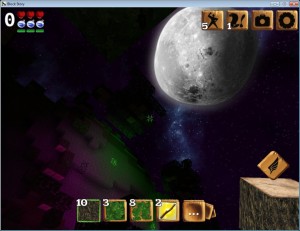 I get dumped on some deserted shore out in the middle of nowhere. Apparently I’m not alone… there’s some viking dude wandering around here too. Cool. That’s different.
I get dumped on some deserted shore out in the middle of nowhere. Apparently I’m not alone… there’s some viking dude wandering around here too. Cool. That’s different.
My first task – my quest – is to… gather wood. Then I am to take the wood that I gathered from the trees, and I am tasked with… making planks out of them. And then, for my third quest, I am tasked to build a… toolbox. With the toolbox I can construct more complicated items. My next quest, in fact, is to construct a pickaxe. But the clock is ticking, and it soon gets dark… and the monsters come out at night.
Is this sounding familiar? It does to me, too. But I’m not playing Minecraft. I’m playing Block Story for the PC.
On paper, this sounds like a totally awesome game. Take the open-world, gathering, and crafting of Minecraft, but add RPG elements like character development and questing, and a very wide variety of enemies. If you were to ask me what I’d like to see done to Minecraft to make it more awesome for me, personally, that’s almost exactly what I’d ask for. Okay, I’d ask for a huge number of magical items that I could craft or loot, but hey, on paper, that’s awesome.
That’s the theory. In practice…
I really wanted to like Block Story. And as this is a “quick take,” just giving some early impressions rather than an exhaustive review, I can’t say that if I were to continue for 20 hours or so, I might not find myself loving it. To be fair, the early alpha version I initially played of Minecraft didn’t impress me much at first, either.
The issue is that the game is too much of a Minecraft clone… a poor one. The world doesn’t display as well, there’s not as much solid feedback to your actions, and the block graphics are largely plain-vanilla. In Minecraft, the enemies were given the same kind of pixellated look as the blocks, in order to maintain a consistency of style. Block Story doesn’t have that, which makes it feel uneven.
Now, Minecraft has been around for several years now, and for a good chunk of it has enjoyed an awesome budget and team. I wouldn’t normally want to rip on a Minecraft-style game for the fact that it isn’t Minecraft. The problem is that this game is literally too much of a clone. Even many of the recipes for Minecraft work in this game. There are certainly some differences, but often the differences are either cosmetic or feel like a downgrade in quality.
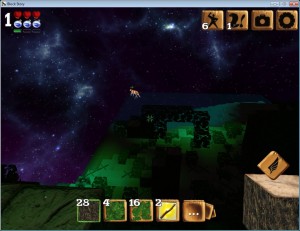 Unfortunately, the RPG side of the game isn’t stellar, either. As you gain levels, you gain skill points you can use to improve a number of abilities. You can add to things like walking speed, melee weapon damage, the amount of time you can hold your breath underwater, hit points, etc. The quests are not much to write home about either. Most of them seem to be oriented around the tutorial to teach you how to play the game (which is reasonable). But then there’s one of the early quests where the viking will give you a sword and ask you to pay for it with a number of gold and coal blocks. Considering how easy it is to make a sword (I actually made one before given the quest, because the weapon quest had been superseded by an event-based quest to gather lumber by the time I’d talked to the character), this is kind of a ridiculous request. You could build a hundred swords in the time it takes to pay for the freebie.
Unfortunately, the RPG side of the game isn’t stellar, either. As you gain levels, you gain skill points you can use to improve a number of abilities. You can add to things like walking speed, melee weapon damage, the amount of time you can hold your breath underwater, hit points, etc. The quests are not much to write home about either. Most of them seem to be oriented around the tutorial to teach you how to play the game (which is reasonable). But then there’s one of the early quests where the viking will give you a sword and ask you to pay for it with a number of gold and coal blocks. Considering how easy it is to make a sword (I actually made one before given the quest, because the weapon quest had been superseded by an event-based quest to gather lumber by the time I’d talked to the character), this is kind of a ridiculous request. You could build a hundred swords in the time it takes to pay for the freebie.
If the quests are only there to force you to chew up time, I guess they succeed. They do give you some goals to work for (something which is often lacking in Minecraft), but there’s very little by way of story or much feeling of progression towards any kind of end-goal. It’s very much a case of running and fetching for the sake of keeping you busy. Now, granted, in a wide-open, randomly-generated world, there are definitely some serious constraints to what the developer can actually do with quests.
Then there’s the port. This game was ported from the Android (it’s in Unity, so that’s not a major task). This can be kinda cool – you can actually move your world data over between platforms. But it feels very “mobile-y” in flavor and interface. Some of the help screens have not even been rewritten for the PC, still offering touch-screen instructions.
So you have a poor Minecraft clone, poor RPG mechanics tacked on, and a poor port from a different platform. This does not sound like a recipe for success.
The biggest problem is that the only thing really original added to the mix is the quick-and-dirty RPG aspect. If he’d deviated a bit more from his inspiration and created a block-world that felt less like the other game, it would be easier to take Block Story on its own merits. It doesn’t have to be as fully-featured. The world just needs to have it’s own creative theme or unique flavor. I am willing to forgive a great deal if I’m sucked in by how interesting the game world is.
Unfortunately, I fear my explorations into the world of Block Story may have come to an end already. I don’t see myself playing much more if it. I hate dumping on the efforts of other indies out there, but this does seem like a missed opportunity. More polish, more of a unique take on the word, getting serious about the RPG side of it, and making it a real PC game would have served it really well. Maybe there’ll be a sequel that really gets it right, and I’ll look froward to that one.
Fortunately, if you are curious, there is a free version that doesn’t allow you to save, but otherwise allows full exploration. It could be that this is exactly the sort of experience you are looking for. In which case – have fun!
Filed Under: Impressions - Comments: Comments are off for this article
Research – Going Down the Rabbit Hole
Posted by Rampant Coyote on May 23, 2014
Today’s post is actually on another site – in this case, Xchyler Publishing. I’m a guest poster there today…
Author Spotlight – Jay Barnson: Researching the Story, or Down the Rabbit Hole
This is another article that could have been written about game design as easily as story development. And for me, it’s often one of the more fun parts of development. While a lot of it happens up front, early in the design process, it’s not something that’s completely restricted to a “phase” or anything. I still go back to research mode whenever it’s needed.
Frayed Knights has also been delightful to do research for. The topics run the gamut – from research into actual old castles and dungeons, to the history of dice-and-paper RPGs, to re-playing (or sometimes, playing for the first time) some classic old-school computer RPGs. I spent a lot of time digging through old copies of Dragon Magazine to remind myself of the “feel” of the hobby back in the day, as that was the essence of what I wanted to capture in the game. That’s something I’d do just for fun, but it’s nice to have a purpose.
In the case of my short-story for Terra Mechanica, I spent a lot of time researching telegraphy and the telegraph industry circa 1880. My discoveries were surprising and actually kinda wrecked my initial story idea. It didn’t matter – what I ended up with was much stronger, I thought. Anyway, the above blog article goes into some of the fun details – as well as describing how all that research gets used.
Filed Under: Books, Production - Comments: Comments are off for this article
The Rampant Coyote Gets Interviewed – At a Writing Blog!
Posted by Rampant Coyote on May 22, 2014
Yes, you are gonna hear more from me on the authorial front, especially over the next couple of weeks. There’s a new emphasis on the word “Tales” here at “Tales of the Rampant Coyote.”
Today, I have an interview posted at the J. Aurel Guay Archive. While it’s focused on writing, I do talk a little bit about the similarities and differences between writing for a conventional medium, and writing for video games. Also about indie-dom in both fields, where I got my ideas, etc.
Long-time readers may recognize the advice I give for new authors – which I admit earlier is stolen completely from my game development experience, in hopes that they are more alike than different – in this excerpt:
“Going back to my example of Bujold – the ‘boxes’ that define a subgenre are for use by marketers, not by authors. Don’t allow yourself to be too constrained by the conventions of the category. Push the boundaries. Nobody’s going to be impressed by yet another cookie-cutter story, no matter how well-written.
“And finally, write for your readers, not for the critics. It’s great to get a good review or an award, but what really matters is that you provide something of value to your audience.”
Anyway – I hope it is an entertaining read! (Both the interview, and the upcoming book…)
Conversation With Jay Barnson – Author Interview at the J. Aurel Guay Archive
Filed Under: Books, Interviews - Comments: Comments are off for this article
Roguelike Why? Why Like Rogue?
Posted by Rampant Coyote on May 21, 2014
 It’s kind of weird to imagine that roguelikes have become such a popular genre lately. I’ve grown up with them being a niche for the geeks’ geek.
It’s kind of weird to imagine that roguelikes have become such a popular genre lately. I’ve grown up with them being a niche for the geeks’ geek.
I guess I should have known better. Long before I met her, my wife was a fan of the original Rogue. She’s not much of a gamer. But now her game of choice is a roguelike on her Kindle. Back when I was addicted to Moria back in the early 90s, my big, admittedly naive thought was that it was only a graphics and UI overhaul from being one of the most awesome commercial RPGs ever made (at the time). Diablo and similar games have enjoyed tremendous success borrowing from the roguelike playbook with procedural content.
And now, the field has gotten so broad that we’ve started referring to roguelike-likes (or “Procedural Death Labyrinths,” as my friend Lars Doucet likes to refer to them).
My first “complete” RPG – for the Commodore 64 – could arguably be called a roguelike. I never released it, but it was around the same time as the commercial release of Rogue. It was a simple, procedurally-generated world in a ten-level dungeon of 10×10 rooms. It had a nasty lock-up bug in it that prevented it from being played too long. I never found out what it was, but I thought it had something to do with the C64s garbage collection system in BASIC. I had fun playing it with some friends, though.
Oh, yeah, and it was party-based. Booyah!
There are as many debates out there as to the meaning of “roguelikes” (and “roguelike-likes”) as there have been for the meaning of “role-playing game.” I agree, it’s a lousy term, but people understand it. But being “like” Rogue isn’t necessarily the big point of appeal for me. And honestly, of some of the roguelikes I’ve played lately, I feel like things have gone backwards a bit. Maybe I’ve just been playing the wrong ones, but they feel… dumbed-down, and overly mechanical.
Sure, roguelikes have always been about numbers and managing risk and resources. After all, their predecessors were based on early role-playing games (mainly Dungeons & Dragons), and that was the core mechanic of the early RPGs. It’s fun and compelling. But the dice-and-paper RPGs they emulated way back when were about so much more. Likewise, later in the evolution of the roguelike “genre,” the games were full of all kinds of fun, weird, and often surprising stuff, with lots of challenging decisions to make as the player.
Now, it seems in the indie rush, we’re back to the nothing more than the nuts and bolts of attrition and risk management in combat, and not much else. I appreciate that some developers are really exploring this mechanic to its limits, seeing how much fun they can take the purity of the gameplay. And yeah, we know that simplicity sells. Sometimes. But sometimes, it feels like developers are just phoning it in, cloning the basics without caring why.
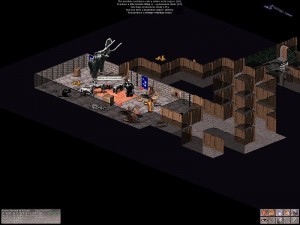 But for a guy who has experienced the richness of games like Nethack (not that I’m a hardcore Nethack player), Moria, and many other games… these games can feel a little shallow. Not that I’m expecting commercial titles to match Nethack. But when even Diablo, optimized for fast-action play, feels more deep and interesting, I gotta wonder what’s up.
But for a guy who has experienced the richness of games like Nethack (not that I’m a hardcore Nethack player), Moria, and many other games… these games can feel a little shallow. Not that I’m expecting commercial titles to match Nethack. But when even Diablo, optimized for fast-action play, feels more deep and interesting, I gotta wonder what’s up.
Now, as for me – I’m an RPG geek. I like roguelikes because of their RPG flavor, not because of their math. I want immersive experiences that challenge my skills, not randomized puzzle games involving monsters. Sure, the more you play a game, the more you become aware of the math and numbers and probabilities behind it, like Neo finally seeing the code behind the Matrix. But by the time I get to that point, I’ve already committed to the context.
For me, for a good roguelike, I’m looking for two things. First, I want interesting procedural content. The word “interesting” could be interpreted a number of different ways, but I generally think of it as having a lot of variety and non-trivial interactions. I want something that would continue to surprise and intrigue me even if I had been the one to create the game.
Secondly, I want a deep rules system that is fun to explore. Yes, I’m talking about exploring a rules system. I would like to play with it, try all kinds of different things, discover all kinds of optimizations, and never really feel like I’ve fully “mastered” it. I think it was Keith Burgun who drew a comparison for roguelikes with the ancient game of Go. It’s a pretty simple set of rules (even simpler than Chess), but the permutations and context make it infinitely challenging by the time you have more than a couple of stones on the board. The depth has nothing to do with the simplicity or complexity of the rules, but more in how context can quickly make determining the “best” action a very difficult decision, even if you have perfect knowledge of the game state and no randomness.
Permadeath? You know, I’m on the fence about this. I know it’s kind of a requirement for a game to be considered a roguelike. The great thing about permadeath isn’t about the current game coming to a permanent end. It’s about the risk of the current game coming to a permanent end. It makes each decision more meaningful. Again, the origin of this mechanic was a combination of technical limitations of the old days and the emulation of dice-and-paper gaming, where there was no such thing as a saved game (and rarely would a game master allow a “takeback”). But it does inhibit the player’s freedom of exploration a bit, depending on the game.
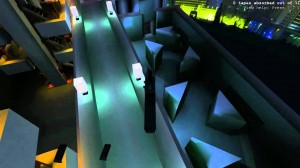 I’m definitely not a purist (but what else is new?). I’m quite pleased with how much the ‘roguelike’ genre is expanding (and outgrowing its restrictions). I love seeing games like FTL and Receiver which take some of the core ideas of the genre but run with them in radically different directions. The graphics don’t bug me – though I do note that a lot of the power of some roguelikes to have some fascinating content was that they were able to present them textually or via very abstract graphics. The imagination is still the most powerful rendering hardware.
I’m definitely not a purist (but what else is new?). I’m quite pleased with how much the ‘roguelike’ genre is expanding (and outgrowing its restrictions). I love seeing games like FTL and Receiver which take some of the core ideas of the genre but run with them in radically different directions. The graphics don’t bug me – though I do note that a lot of the power of some roguelikes to have some fascinating content was that they were able to present them textually or via very abstract graphics. The imagination is still the most powerful rendering hardware.
So what about you? Do you play and enjoy roguelikes? If so, what do you like about them. If not, why not?
Filed Under: Roguelikes - Comments: 8 Comments to Read
